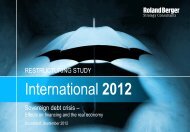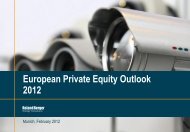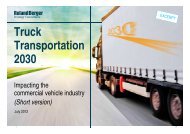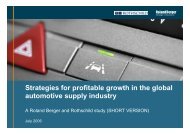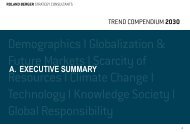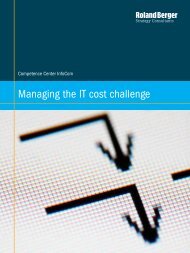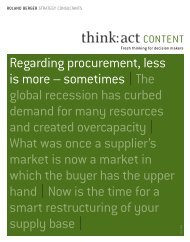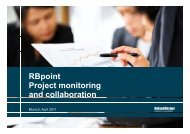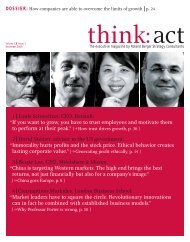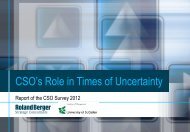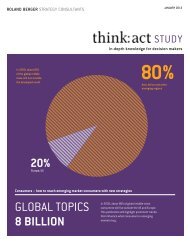Chasing a moving target |The global market place ... - Roland Berger
Chasing a moving target |The global market place ... - Roland Berger
Chasing a moving target |The global market place ... - Roland Berger
You also want an ePaper? Increase the reach of your titles
YUMPU automatically turns print PDFs into web optimized ePapers that Google loves.
ROLAND BERGER STRATEGY CONSULTANTS<br />
VALUE CREATION: SEEING THE WHOLE PICTURE<br />
Following the corruption scandal that has most recently implicated government officials<br />
in Nigeria and Russia, the <strong>global</strong> electrical and engineering giant Siemens has had to pay<br />
EUR 1.4 billion in risk reduction and compliance payments. It is paying the price for<br />
incomplete risk assessment and is reacting as quickly as possible to contain the damage<br />
to the company's reputation and <strong>global</strong> reach.<br />
Elsewhere, toy maker Mattel sees its revenues decline by USD 40 million with analysts<br />
estimating a landslide in losses throughout the key holiday shopping period. The company<br />
is struggling to curtail the damage done following its widely publicized recall of several<br />
products due to faulty design and a failure to meet Western health and safety standards.<br />
What these cases show is just how complex managing all elements in a <strong>global</strong>ized value<br />
chain has become. Even internationalization pioneers are not immune to the pitfalls of<br />
<strong>global</strong> manufacturing and trade. In a world in which transnational products promise the<br />
greatest growth potential, companies struggle to achieve high margins through low-cost<br />
sourcing. At the same time, they face an increasingly <strong>global</strong>ly aware consumer, whose<br />
demands are driven by a sense of ethical, social and environmental responsibility. But<br />
corporate responsibility is only part of the <strong>global</strong> value creation game. Those that picked<br />
up on these trends early in the game – like The Body Shop – were often ridiculed, but have<br />
since proven how effective their strategies were. Today, The Body Shop operates 2,000<br />
stores in 50 countries. L'Oréal recently bought it for EUR 190 million in an effort to expand<br />
the cosmetics giant's "eco-friendly" image.<br />
Companies must create a holistic <strong>global</strong> footprint that respects new principles of sustainability<br />
and is backed by strong corporate ethics. Otherwise they will have difficulty competing in a<br />
<strong>market</strong> in which low cost is no longer the solution to every problem. A seismic shift is occurring<br />
– values are actually driving value creation. The rules of doing business have changed.<br />
And managers need to face a number of key questions to ensure long-term success.<br />
UNLOCKING THE SECRET OF GLOBAL VALUE CREATION<br />
Value creation is a <strong>global</strong> enterprise. If "low cost" were still the only factor driving the process,<br />
then Burkina Faso and Burundi would rank high on the list of most attractive <strong>place</strong>s to do<br />
business. Neither country is known for its exports or for attracting direct investment.<br />
The interdependence of factors influencing business success today makes many managers<br />
uncomfortable. Globalization is driven by highly differentiated factors, adding to the existing<br />
complexities of doing business around the world. Managers are thus wondering what will<br />
drive value creation tomorrow and in the future.<br />
CAN THE INTERNATIONALIZATION OF VALUE CREATION:<br />
Make a valuable contribution to the core business?<br />
Mitigate and spread out current financial, currency and product risks?<br />
Achieve sustainable tax advantages over the long term?<br />
Produce sustainable capital and labor cost advantages?<br />
Help the company tap into current and future innovation and knowledge potential?<br />
To be effective, managers must create a roadmap that integrates <strong>global</strong> value creation and<br />
sustainability programs into the overall business strategy. They can thus direct their capital<br />
and talent toward the most profitable and sustainable growth opportunities.



